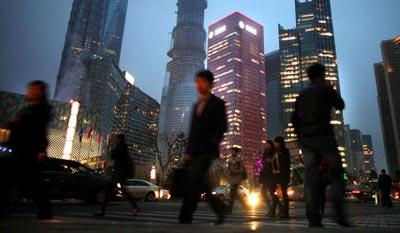Detailed policies of Shanghai FTZ to be gradually unveiled

 0 Comment(s)
0 Comment(s) Print
Print E-mail CNTV, October 31, 2013
E-mail CNTV, October 31, 2013
The Shanghai free trade zone is seen as a testing ground for China's financial reforms and innovation. However, we are hearing some grumbling about inadequate policy support.
 |
|
Detailed policies of Shanghai FTZ to be gradually unveiled. |
It's been a month since Shanghai launched China's first official free trade zone. But public thirst for more financial openness can't be quenched by policies unveiled so far. Some say the free trade zone does not have enough "free" policies.
The curtains fall, flowers and applause turn into mistrust and criticisms in a blink of an eye - to be precise, less than 30 days in the case of the Shanghai free trade zone.
The investment "negative list" is under fire for being too long, that a free trade zone shouldn't keep so many restricted fields. There are also gripes the financial policies are insufficient.
But as chief economist Lian Ping from Bank of Communications puts it: the public has every reason to be harsh, but Rome was not built in one day.
"Shanghai FTZ was launched without waiting for its detailed financial regulations to be in place. Just like the zone was a pilot project, so is the policy framework," said Lian Ping, chief economist at the Bank of Communications.
"They're both improving day by day. It is those mature regulations that have been unveiled. So I believe the government will release more policies when the timing is right. And I believe that it will be very soon."
The one month old Shanghai FTZ has attracted eight Chinese banks and five foreign banks. But as financial regulations are not ready, these banks still share accounts between their branches in and out of the zone.
Still, these lenders are banking on the future of the FTZ.
"We believe the free trade zone is directionally the right thing for the country to do. And we're very optimistic about the development of the free trade zone. We obviously see lots of opportunities. There are also challenges. But I think on the whole, there are more opportunities than challenges that presented to the city," Citibank China CEO Andrew Au said.
Policies for foreign investment and trade are already in place in the FTZ. The next step: more financial innovations. But it will take at least two years' time to issue the complete set of policies.
"More policies involving the supervision by the central bank, banking and foreign exchange regulators will be rolled out soon. More applicable implementation methods will also be unveiled. So we're likely to see more steps to boost financial reforms, such as the liberalization of interest rates, guidelines for offshore businesses within the zone, and internationalized banking regulations," Lian Ping said.
Seven banks are reportedly opening their offshore-account-like "FTZ accounts" within the free trade zone. It means their business in the zone will be conducted under looser rules than other branches. That, more than any fanfare, marks the real start of China's most important financial reform experiment.





